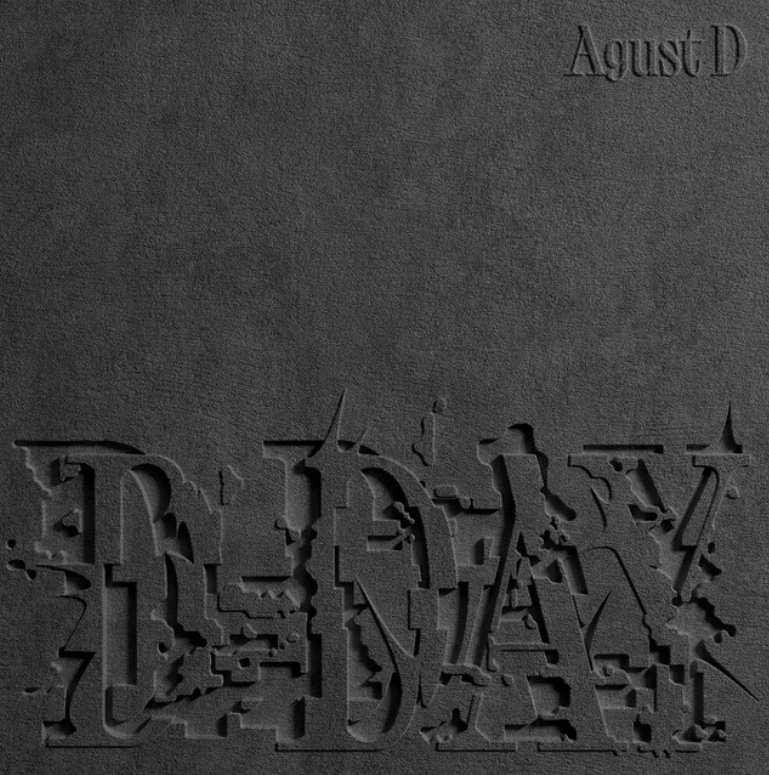For over a decade, BTS’ lead rapper and producer Min Yoongi, more commonly known as Suga, has been under public scrutiny. Living in the epicenter of BTS and K-pop craze, Suga turned to solo music to express his emotions and test his artistic boundaries, eventually creating his alter ego: Agust D.
Agust D is Suga spelled backward with the letters “D” and “T” added to the end in honor of his birthplace of Daegu, South Korea. Suga introduced Agust D to the public in 2016 with his debut EP, entitled “Agust D.” Initially only released on SoundCloud, the EP was an angry response to the extensive hate and groundless rumors circulating BTS that year. Nearly four years later, during the initial months of the COVID-19 pandemic, Agust D released his second mixtape, “D-2.” Unlike the anger fueling his music in 2016, “D-2” was a lyrically dense reflection and documentation of Agust D as a 28-year-old musician.
On April 21 of 2023, Suga released “D-Day,” the final chapter of his album trilogy, featuring 10 songs that bring Agust D’s journey to a close. The backbone of “D-DAY” is the idea of liberation from numerous shackles, most notably anger, societal expectations and the past.
Senior Aarya Joshi was struck by the openness of the themes of freedom and forgiveness. “Suga vulnerably talks about moving on from haters and past traumas to become a better, more improved version of himself,” she said. “I think it’s important that Suga created this album not only as a message to his fans, but also to himself.”
Suga opens his first studio album in a vastly different way than the angry, barbed emotions of his previous works. “Future’s gonna be okay. Look at the mirror and I see no pain,” he raps in the first song, “D-Day.” Liberating himself from his previous negative emotions, Suga steps into the role of a social commentator. “Maybe the stupid past is over now. Let’s toast again to us who will be reborn. In a world full of hate, hatе is even more unnеcessary,” he continues in the opening track.
The social commentary continues with later tracks like “극야”, or “Polar Night” in English. Suga starts the song by posing a question: “Between so many truths and so many lies, are we seeing this world right?” “Polar Night” takes on societal division and points out the flaws in righteous attitudes. “After a series of plays, left and right, black and white, the audiеnce sees blood as they bite еach other,” he raps. “A war without guns, an omnipotent ills.”
The album’s title track, “Haegeum,” encapsulates the theme of the album and Agust D’s message. Naming the song “Haegeum” is a play on words as it refers to both a Korean traditional string instrument—heard throughout the background of the song—and the Korean word for liberation.
In “Haegeum,” he calls out those in society, politics and the entertainment industry who have lost touch with reality. “Slaves to capitalism, slaves to money, slaves to hatred and prejudice, slaves to YouTube, slaves to flexin’. Selfishness and greed have gone off the rails,” he raps in the song. “This song’s a haegeum. Get on board now, this lively rhythm. A new kind of haegeum.”
Although Agust D’s old anger might have mostly evaporated away, “D-DAY” still critiques BTS’ haters. “HUH?!” features Suga’s fellow band member J-Hope and addresses the malicious rumors surrounding Suga and BTS. “It’s disgusting to pretend that you’re clean. Please check your s**t first. Many articles and gossip, the villain in the information age.”
Beyond the liberation from negative feelings that “D-Day” provides, it also represents letting go of the past and embracing the future. “As time goеs by, someone will be forgottеn. Just do what you want. Time is like a wave. It will be washed away like the ebb,” Suga sings in “Life Goes On.” Also showcased in “Life Goes On” is a reflection on Suga’s past in BTS and the struggles he has overcome. “The place where I passed for ten years with countless wounds and glory. Looking back, each moment of memories, I’ve been running.”
One thing Suga makes clear in “D-Day” is that there is a difference between liberating oneself from the past and becoming ignorant of past experiences.
Perhaps the album’s most relatable song is “Amygdala” in which Suga reflects on some of his most painful memories: his mother’s heart surgery, his shoulder injury after getting hit by a car and getting a call about his father’s liver cancer while in the middle of a busy schedule. Despite the pain of these memories, Suga frees himself by overcoming these trials without forgetting them. “So, is this numerous pain all for me? The never-ending trials weren’t able to kill me and I bloom a lotus flower again,” he raps.
“Amygdala” was the song that stood out most to junior Rupika Jai Ganesh. “‘Amygdala’ was raw and intimate with Yoongi sharing his traumas and growth. What impacted me the most was the fact that Agust D’s scar was self-inflicted, but by the end, it heals,” she said. “Yoongi fought through the pain and desperation, begging for his amygdala to give him a sense of direction and purpose.”
While “Amygdala” already exposed Suga’s vulnerability and emotions, the accompanying music video portrays his struggles with even more rawness. The video visualizes the struggles expressed in the lyrics, including Suga’s car accident, depression and his parents’ ailments. Though it is a difficult song, bringing up bad memories allowed Suga to showcase his progression from the past in order to live a better future.
“I am so genuinely amazed by the album. The songs were incredibly produced and had such meaningful lyrics and I could definitely tell how much care Yoongi put into this album,” Jai Ganesh continued. “The music videos for ‘People Pt 2,’ ‘Haegeum’ and ‘Amygdala’ were produced beautifully and had stunning visuals that connected so well with the message of the songs.”
It takes a tremendous amount of courage to be this vulnerable and honest in a body of work. Suga is destigmatizing the struggles and suffering of humanity. Despite the change in tone from his previous solo work, “D-Day” feels intimately Suga. The collaborations on the album— including BTS’ J-Hope, soloist IU, The Rose’s Kim Woosung and the renowned late Japanese composer Ryuichi Sakamoto— complement Suga throughout his story.
Though Jai Ganesh is sad to see the end of Agust D’s trilogy, she is excited to see what the future holds. “This trilogy was Yoongi’s way of expressing the hardships he went through and ‘D-Day’ was a fitting conclusion,” she said. “It was raw and emotional but the last track, ‘Life Goes On,’ presents hope for the future. I’m happy to see Yoongi grow and let go of the hurt he faced in years prior.”
“D-Day” is available on all streaming platforms and is already smashing records: Suga is the first rapper in history to exceed one million sales in a single day. Suga is also soon to commence his first solo world tour, starting in Elmont, New York on April 26 and ending on June 25 in Seoul, South Korea.
Agust D’s story closes as a thought-provoking force with tracks that guide the listener through the struggle of emotional turmoil, modernity and societal shackles to advance from the past to a brighter future.









